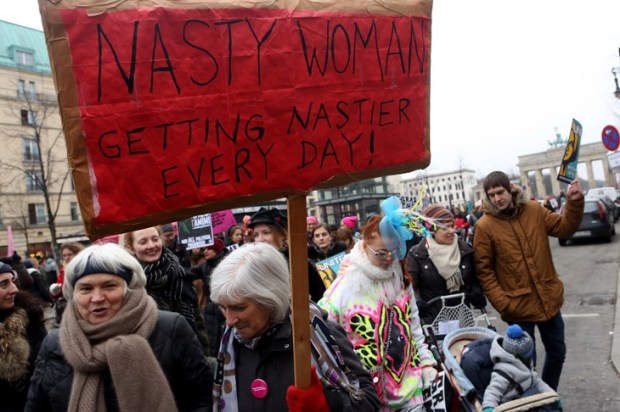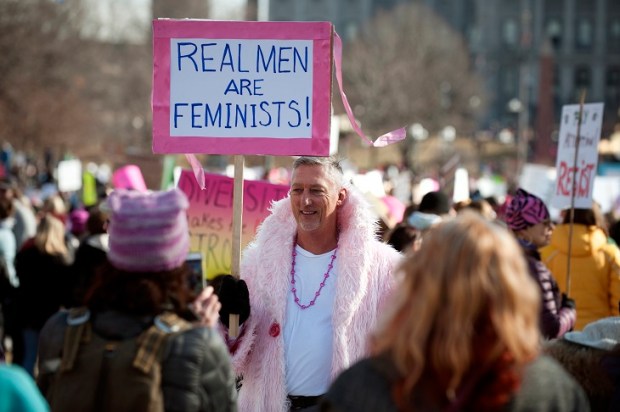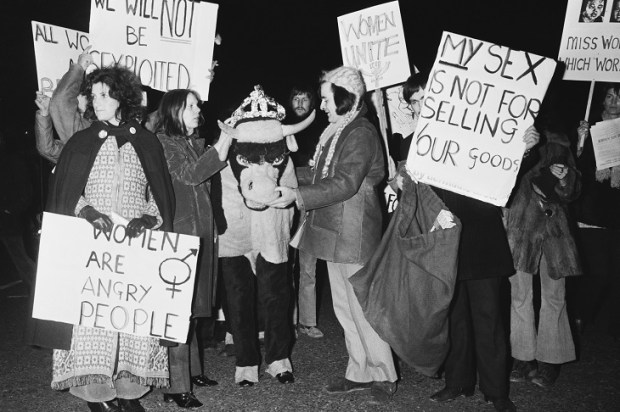Predictable accusations have greeted the announcement by Manhattan Institute fellow Chris Rufo, trustee of the New College of Florida, that the college is abolishing its gender studies program in a move designed, he wrote, to ‘begin rolling back the encroachment of gender ideology and queer theory on its academic offerings’.
Earlier this month, Rufo explained in City Journal that cancelling the program is part of the university’s renewed commitment to ‘revive classical liberal education and restore the founding mission of the college’.
In response, 36 professors opposed to the plan have either left the college on their own initiative or been dismissed, and critics have been quick to paint the gender studies decision as an attack on academic freedom. They say that it will transform New College of Florida into a know-nothing institution in which critical thinking and open-minded exploration will be walled out of the school.
One might have thought that with close to four thousand degree-granting post-secondary institutions in the United States, the gender warriors might have let a single institution minimise its gender offerings. But feminist ideologues never sleep, and their rhetoric around New College of Florida has moved immediately into DEFCON 2 territory.
As he publicly announced his resignation from the school, Nicholas Clarkson, a transgender man and the school’s only full-time professor of gender studies, branded all of Florida as ‘the state where learning goes to die’ proclaiming his refusal to remain ‘in an environment characterise by censorship, refusal of accountability, blatant disregard for students’ well-being, and consistent denigration of both my work and my personhood’.
The full text of his letter can be read here.
The President of the National Women’s Studies Association said that controversy over gender studies was ‘a struggle for the heart and soul of this nation’ and claimed:
‘If we let them win this battle, they will never stop attacking us, threatening us and intimidating us.’
Reading these melodramatic accusations, one might conclude that it is highly unusual for university programs to be scaled back or disbanded. But in fact, it happens all the time, usually without so much drama. Universities continually make decisions about their emphasis, programming, and public image in order to secure funding and attract students. Individual departments and programs do the same, justifying their course requirements, defending their budgets and hiring needs.
Often cuts are made to courses and programs that were once at the core of a classical education. As a faculty member at the University of Saskatchewan and University of Ottawa, I was often saddened to see traditional programs diluted of content and rigour in the name of (alleged) relevance or faculty/student interest. At the University of Ottawa, the Classics department was folded in with Religious Studies to create what seemed a mishmash of courses and options, some focusing on ancient languages and culture, some covering modern world religious, including Amerindian and Inuit traditions, and even a special offering on non-religion.
The description of the department’s offerings states that the programs’ ‘11 full-time professors specialise in a wide range of fields that occasionally interlock, though for most day-to-day purposes […] operate independently’.
In other words, two small groups of scholars, unable to represent all major dimensions of their separate disciplines, must make peace with fragmentation and incoherence. I can’t say for sure that secularism and progressivism played any role in the reduction of the two programs, but given that neither lends itself readily to intersectional feminist orthodoxies, it seems possible. A few years ago, Princeton decided to abolish the Latin and Greek language requirements for its Classics major over concerns about ‘systemic racism’.
The obvious difference between a program in Classics and one in gender studies is that it is extremely difficult to learn ancient languages and history without the guidance of trained specialists. Nearly anyone with access to social media can figure out gender studies.
But what about the claim that gender studies should be a part of any true classical liberal education?
This is the argument made by Marcie Bianco, feminist author of Breaking Free: The Lie of Equality and the Feminist Fight for Freedom, which argues, according to the author’s blurb, that, ‘…equality is a racist, patriarchal ideal that perpetuates women’s systemic oppression.’ In an opinion piece for MSNBC New College of Florida’s attack on gender studies gets ‘classical liberal arts’ all wrong, Bianco claims that gender studies embodies the true essence of a liberal arts education in opposition to the theocratic mental enslavement sought by a right-wing agenda.
Bianco detects a religious agenda in Rufo’s reference to the classical pursuit of ‘the true, the good, and the beautiful’. Though she admits that Rufo never mentions Christianity in his announcement, she notes that because Christian Neoplatonists defined God as ‘truth, goodness and beauty’, that counts as a ‘direct allusion’ to a not-so-secret plan to smuggle in ‘doctrinal Christianity’ under the guise of the liberal arts. Bianco’s observation might be slightly more persuasive if so many non-Christians hadn’t used the phrase ‘the true, the good, and the beautiful’ over the years (for a detailed genealogy, see John Levi Martin’s 50-page analysis).
Bianco wants her readers at MSNBC to believe that gender studies is under attack precisely because, as a bastion of truth-seeking and critical interrogation, it stands against the ‘ignorance’ that Ruffo conservative associates favour. Gender studies, she explains, ‘…is simply the rigorous examination of how arguably the human dynamic and social and political roles of gender have acquired meaning and shaped humanity and our institutions for centuries across cultures.’
As to the content of gender studies and why it matters to a classical liberal education, Bianco can only attest that it is ‘the epitome of learning’, which is ‘to ask questions, to examine, to be critical and think critically’. She assures us that it is ‘the polar opposite of the ideological indoctrination that conservatives seek’.
Unfortunately for those of us who like the sound of ‘rigorous examination’ and ‘critical’ thinking, they are perceived by some fans of gender theory to be merely code for a series of hermetic claims about hegemony, language, power, and systemic oppression that brooks no opposition. Try standing up in a gender studies course to argue that we do not live in a rape culture, and see how many instructors applaud your critical thinking. Try arguing that biology, not ‘discourse’, is the primary driver of gender roles. Try arguing that gender dysphoria is a disorder that should be treated as such, not augmented with hormone blockers and surgery. Try arguing that white men do not have privilege as white men, and that in fact, they experience systemic discrimination in North America. Any such critical thinking will not be welcomed.
A liberal arts education, by contrast, encourages questioning because it pushes no specific iron-law ideology; rather, it examines ‘the best that has been thought and said’, as Matthew Arnold put it, and draws rich content from the greatest thinkers in history. Unlike the fly-by-night trendiness of gender ideology, a classically liberal education is founded on the tradition of Great Books – from the ancient Greeks to the Founding Fathers, from (in the English literary tradition) Beowulf to Virginia Woolf. Long-standing classics of philosophy, art, literature, and political thought are taught, as much as possible, without ideological distortion, presented in their particular contexts and carefully read (not blithely dismissed or acclaimed) so that students can grasp their enduring significance. Once their meaning is grasped, students are encouraged to question, judge, compare, and criticise.
Gender studies has never done anything like this. It has been judged from the beginning in ignorance and rage, without proportion and without rational argument or sound evidence. It has pushed lies as truth (see, for example, Christina Hoff Sommers’ debunking of fundamental falsehoods about women’s experience in Who Stole Feminism? How Women Have Betrayed Women), denying biology and history.
From its earliest incarnations, gender studies have promoted preposterous contentions about Woman as Other (Simone De Beauvoir), the suburban family as a comfortable concentration camp (Betty Friedan), the social construction of gender (Kate Millett), women as Playboy Bunnies (Gloria Steinem), the female eunuch (Germaine Greer), honourable man-hating (Robin Morgan), rape culture (Susan Brownmiller) gynocide (Mary Daly), compulsory heterosexuality (Adrienne Rich), white privilege (Peggy McIntosh), intersectionality (Kimberlé Crenshaw), family abolition (Sophie Lewis), gender as performance (Judith Butler) and the difficulty of distinguishing rape from normal sex (Catharine MacKinnon), to name only a few. Its purpose was never to encourage critical thought, let alone disagreement or resistance.
Marinating in the impenetrable jargon and the gaseous outrage of victim politics, students learn almost nothing of substance except to hate their society and to embrace the utopian necessity of its destruction.
While deploring New College of Florida’s alleged gender bigotry, critics have also pointed out (somewhat paradoxically) that the move is hollow: gender studies at the college was an interdisciplinary program, meaning that it had only one full-time faculty member and primarily drew on courses taught by academics working in various established departments, many of whom (despite the culling) still work on gender and intersectional theory in their disciplines.
But far from detracting from the significance of what the college has done, this reality suggests the depth of the rot gender studies has brought to academic departments, a rot that has now spread throughout the arts, humanities, and social sciences, even into many faculties of business, journalism, law, and medical science, as research is corrupted by social and political advocacy. It will not be easy to reform the universities. Still, New College’s decision to abolish an avowedly radical, anti-family, and anti-social program is good in itself and sends a good signal: dispassionate research, the genuine pursuit of truth, and the transmission of the Western heritage are in; facile isms, intersectional victimology, and overt indoctrination are out. As the (feminist) slogan goes: Never retract, never explain, never apologize: Get the thing done and let them howl.
This article is an excerpt. To read the full piece, visit Janice’s blog.

























